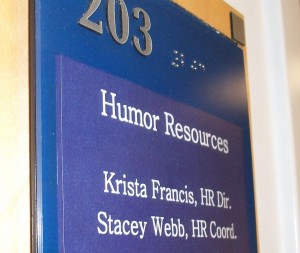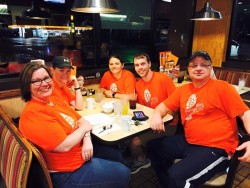Last week I had the pleasure of speaking at the Alabama SHRM Conference. It was a great experience, and I love taking notes from other speakers throughout the day as well. My friend Dawn Burke from Daxko was speaking about stress on our employees and most notably on the HR staff. There are several reasons we face stress, including the work we do (terminations and investigations, anyone?), the sensitive nature of our jobs, and this pervasive idea that we shouldn’t be friends with anyone in the workplace because we “might” have to face them in a difficult conversation one day.
I have always thought that was somewhat silly, but hearing Dawn talk about it validated my thinking somewhat. When I think about the times I have had to investigate people at work or terminate them for cause, the people weren’t the type of folks I would have been friends with anyway. And even if I was, they were less than 1% of the company’s workforce. If I had decided not to be friends with anyone I would have instantly closed off that entire population of people, ultimately making my work less pleasant and enjoyable.
Today I hope to eliminate this idea that we should close ourselves off from the rest of the world by encouraging you to make some friends in the workplace.
HR should be friends with staff. Problems with that are the exception, not the rule. Via @DawnHBurke #alshrm15
— Ben Eubanks (@beneubanks) May 20, 2015
You Need Friends at Work
Let’s go with someone reputable, like Gallup, to make this argument.
Human beings are social animals, and work is a social institution. Long-term relationships are often formed at work — networking relationships, friendships, even marriages. In fact, if you did not meet your spouse in college, chances are you met him or her at work. The evolution of quality relationships is very normal and an important part of a healthy workplace. In the best workplaces, employers recognize that people want to forge quality relationships with their coworkers, and that company allegiance can be built from such relationships.
The development of trusting relationships is a significant emotional compensation for employees in today’s marketplace. Thus, it is easy to understand why it is such a key trait of retention, and is one of the 12 key discoveries from a multiyear research effort by The Gallup Organization. Our objective was to identify the consistent dimensions of workplaces with high levels of four critical outcomes: employee retention, customer metrics, productivity, and profitability. The research identified 12 dimensions that consistently correlate with these four outcomes — dimensions Gallup now uses to measure the health of a workplace. An associated research effort, in which Gallup studied more than 80,000 managers, focused on discovering what great managers do to create quality workplaces.
This item — “I have a best friend at work” — is clearly one of the most controversial of the 12 traits of highly productive workgroups. In answering this item, many employees do not stumble over the word “friend,” because they have many friends at work. Instead, they get stuck on the word “best,” because they feel the term implies exclusivity, and they have trouble identifying one “best friend” among their coworkers.
Gallup discovered the power of this item in identifying talented workgroups — that the strongest agreement occurred in the most productive workgroups. Because some employees had difficulty with the word “best,” Gallup went back to those groups and softened the word to “close” or “good,” or excluded the word “best” entirely. When this was done, however, the item lost its power to differentiate highly productive workgroups from mediocre workgroups. This suggested that the use of the word “best” actually pinpoints a dynamic of great workgroups.
Okay, so friends at work are important to say the least. But let’s say that you have subscribed to the “no friends at work” rule for some time now. How do you start and reverse the trend?
By being friendly.
Here are a few stories about people I know that work in HR that I would say are better than the average and have cracked the code on how to be friendly with staff.
 Krista Francis is the HR Director for Jubilee of Maryland, a nonprofit organization. As you can see in this picture, she changed the title of their department for a time to “Humor Resources” as a way to get employee comments and demonstrate their own sense of humor in the team. I think this is fun because people often see HR as the “no police,” not as a source of humor. Side note, check out the Levity Effect if you want more ideas on this.
Krista Francis is the HR Director for Jubilee of Maryland, a nonprofit organization. As you can see in this picture, she changed the title of their department for a time to “Humor Resources” as a way to get employee comments and demonstrate their own sense of humor in the team. I think this is fun because people often see HR as the “no police,” not as a source of humor. Side note, check out the Levity Effect if you want more ideas on this.
Dawn Burke, the speaker I referenced at the beginning of this post, works for Daxko. The company provides cubes for all employees, including HR. That means that instead of the snazzy corner office, they get to work in and among the employee population on a daily basis. There are private areas for when times call for them, but I think this helps to break down emotional barriers with employees by breaking down any physical barriers that exist.
How I’ve Done It
Now, I certainly don’t have a monopoly on making friends as an HR pro, but I have several stories about how I have made this work for me that I’d like to share.
In the past when I had the chance to work in a cube environment, I actually appreciated being close to the employees I was serving. Anyone could stop by with questions at any time and didn’t feel like they were bothering me. When I moved to an office it changed that dynamic, even in subtle ways, and I missed the cubicle for that reason.
I also took time to invite random employees to lunch because we shared some common interest. Aaron the Engineer and I always went to lunch and talked about kids, building things, and faith. In the afternoons after work, Duke the Program Manager and Tina the Engineer were always amazing running partners and we could share stories and learn from each other. I also enjoyed chatting with Dave the Systems Analyst about his band and other fun tech-y type things. So many great memories!
Find people who have similar interests to your own and become genuine friends. For instance, in this photo I am standing with my good friends Duke and Tina at the Cotton Row 10k last year. We won the corporate team competition. We started running at work together.
In this photo I’m hanging out with Trish and Steve, two of the smartest, nicest people I’ve met, at the Ultimate Connections event earlier this year. I met both of them through a shared interest in HR and improving the profession.
In this picture I’m looking very chipper despite it being 3:00am at the time. This is our celebratory dinner after the annual midnight 5k that we put on to support our local food pantry. Each of these people is passionate about helping others and supporting the needy, which is why we spend dozens of hours planning this event annually.
So, think about how you can connect with those around you. It is a chance to enrich your own life and the lives of those around you.
Friends make you better, and better friends make you even better.
Are you friends with people at work? My guess is the smaller the organization the more likely HR folks are friends and the larger the organization the more likely they are not, but maybe that hypothesis is incorrect. I’d be genuinely interested in hearing some stories from others.



I also believe that the friendlier a working environment is, the better employees feel and work. However, while some people make new friends as soon as they enter the room, others are more reserved. Not to mention that for some, competition beats the idea of friendship. So I was thinking, is the company responsible in any way to promote friendship among employees? If the answer is yes (and it should be), we need to think of a way to introduce this aspect in the organizational culture and start at a smaller scale, the HR department. It is also true that the larger the company, the greater the challenge.
Pingback: HR and Friendship: A Tricky Business | TALENT DISCOVERI